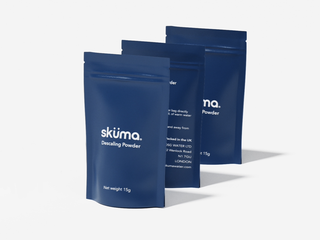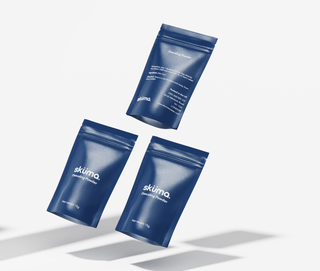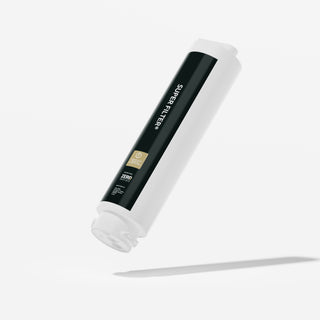Al wekenlang besteedt de media aandacht aan een onderwerp dat ons allemaal aangaat: de kwaliteit van kraanwater en de impact ervan op onze gezondheid. Maar naast de directe risico's komt er uit wetenschappelijk onderzoek een essentiële dimensie naar voren: het effect van microverontreinigingen op ons darmmicrobioom , het microbiële ecosysteem waarvan een groot deel van onze immuniteit en hormoonbalans afhangt.
Wat officiële gegevens onthullen
PFAS (de "eeuwige chemicaliën"), microplastics, zware metalen, farmaceutische resten, pesticiden en hun metabolieten, vluchtige organische stoffen, perchloraten... Oneindig kleine sporen uit de landbouw, de industrie of ons dagelijks gebruik, waarvan de impact op de gezondheid steeds meer wordt gedocumenteerd en bewezen.
Officiële gegevens uit heel Europa bevestigen dat kraanwater, zelfs als het "drinkbaar" is, onzichtbare verontreinigingen kan bevatten. Deze zijn met het blote oog niet waarneembaar, maar toch heel reëel.
Drinkwater is niet altijd microbioomvriendelijk water
In Europa stellen gezondheidsautoriteiten precieze grenswaarden vast om de drinkbaarheid van water te garanderen. Deze normen garanderen dat drinkwater geen direct gezondheidsrisico vormt, maar garanderen niet de absolute zuiverheid of de veiligheid op lange termijn – met name wat betreft onze darmflora.
Jaarlijks tonen enkele duizenden monsters aan dat kraanwater, zelfs in sporenhoeveelheden, honderden verschillende chemische stoffen kan bevatten. Waaronder:
-
nitraten uit intensieve landbouw,
-
farmaceutische resten (hormonen, antibiotica, ontstekingsremmers),
-
PFAS, deze ‘eeuwige chemicaliën’ die zich in organismen ophopen,
-
microplastics, nu aangetroffen in meer dan 90% van de monsters in Europa,
-
zware metalen (lood, koper, kwik), vrijgekomen uit oude leidingen,
-
en pesticiden en hun metabolieten, waarvan sommige de referentiewaarden regelmatig overschrijden.
Deze verontreinigende stoffen zijn vaak in oneindig kleine hoeveelheden aanwezig, ver onder de wettelijke drempelwaarden. Wetenschappers wijzen echter op het risico van cumulatieve chronische blootstelling, met een directe impact op ons darmecosysteem: wanneer ze zich in het lichaam ophopen, kunnen deze stoffen de diversiteit van het microbioom veranderen, het endocriene systeem verstoren, de lever aantasten of het immuunsysteem aantasten .
Hun effect ligt dus niet in de eenmalige dosis, maar in de dagelijkse herhaling.
Waarschuwing van een expert: microbioom, hormonen en hardnekkige verontreinigende stoffen • Dr. Christian Boyer
Dr. Christian Boyer, opgeleid diëtist-voedingsdeskundige, doctor in de gezondheidsbiologie, consultant, spreker en trainer op het gebied van gezondheid: "Menselijke blootstelling aan bepaalde stoffen zoals microplastics heeft een negatieve invloed op de darmflora. Deze deeltjes, met name aanwezig in kraanwater, kunnen de microbiële diversiteit verminderen, de proliferatie van potentieel schadelijke bacteriën bevorderen en de integriteit van het darmslijmvlies direct aantasten. De effecten van chronische blootstelling aan deze stoffen zijn nog onvoldoende onderzocht, maar kunnen blijvende gevolgen hebben voor de darm- en systemische gezondheid.
Tegelijkertijd zijn geperfluoreerde en polyfluoralkylverbindingen (PFAS) – bekend om hun persistentie in het milieu – duidelijk geïdentificeerd als hormoonverstoorders bij mens en dier. Blootstelling aan deze stoffen wordt in verband gebracht met een veranderde schildklierfunctie en een verminderde productie van androgene hormonen, met name testosteron.
Ook verschillende zware metalen (zoals kwik, cadmium en lood) kunnen de geslachtshormoonspiegels veranderen en de normale werking van de schildklier verstoren.
Over het algemeen lijkt de schildklier een van de organen te zijn die het kwetsbaarst zijn voor persistente milieuverontreinigende stoffen (PFAS, zware metalen, pesticiden, enz.), vanwege de hoge stofwisselingsactiviteit, het vermogen om jodium te concentreren en de gevoeligheid voor oxidatieve stress en hormonale verstoringen.
Deze wetenschappelijke observatie roept een essentiële vraag op: hoe kunnen we ons microbioom en onze hormoonbalans beschermen tegen deze chronische blootstelling?
Het antwoord: moleculaire filtratie om het microbioom te behouden
In deze context is Sküma Water onlangs onder de aandacht gebracht als een wetenschappelijk en praktisch antwoord op dit probleem.
Het systeem combineert drie zuiveringsstappen die zijn geïnspireerd op de medische wereld:
-
Sedimentaire voorfiltratie : houdt zichtbare deeltjes (zand, roest, kalkaanslag) tegen.
-
Hoogwaardige actieve kool uit kokosvezels — vangt chloor, VOC's, zware metalen en bepaalde pesticiden en PFAS op.
-
Omgekeerde osmose — een membraan van 0,0001 micron elimineert tot 99,9% van de onzichtbare verontreinigingen, waaronder microplastics, farmaceutische resten en PFAS.
Geavanceerde technologie om uitzonderlijk zuiver water te produceren, nu ook voor thuisgebruik, en in staat om de integriteit van het darmmicrobioom te beschermen .
Bewezen resultaten, bewezen bescherming
In februari 2025 werd het Sküma Super-Filter getest en gecertificeerd door een onafhankelijk, door COFRAC geaccrediteerd Frans laboratorium.
Ongeëvenaarde resultaten:
-
Meer dan 230 moleculen getest
-
99,99% eliminatie van alle verontreinigingen
-
Waaronder 165 pesticiden, 20 PFAS, 98% van de microplastics, evenals farmaceutische resten en zware metalen.
Door deze stoffen te verwijderen, draagt Sküma Water bij aan het behoud van de microbiële diversiteit en het verminderen van hormoonverstoringen die verband houden met drinkwater.
Na zuivering: remineralisatie ter ondersteuning van de darmgezondheid
Perfect gefilterd water moet ook levend en functioneel zijn, en de hydratatie van cellen en de balans van het microbioom ondersteunen.
Daarom completeert Sküma haar proces met intelligente remineralisatie: de MY™ Bases-profielen brengen calcium, magnesium en kalium opnieuw in om de elektrolytenbalans te herstellen en de cellulaire hydratatie te ondersteunen — twee belangrijke elementen voor een gezond microbioom.

Het beschermen van uw microbioom begint met het water dat u drinkt
Normen garanderen veiligheid, maar geen bescherming van het microbioom. Gezien de toenemende wetenschappelijke gegevens over de impact van microverontreinigingen op onze darmflora en hormoonbalans, lijkt het essentieel om het voorzorgsprincipe toe te passen op onze hydratatie.
Alleen moleculaire filtratie in combinatie met gecontroleerde remineralisatie maakt het mogelijk om echt gezond en evenwichtig water te verkrijgen dat ons darmecosysteem respecteert.
Met zijn drievoudige filtratietechnologie en gecertificeerde resultaten belichaamt Sküma Water een nieuwe generatie zuivering: een generatie die wetenschap, transparantie en langdurige bescherming van het microbioom combineert.
Verder lezen:
Microplastics en de menselijke gezondheid: de verstoring van het darmmicrobioom en de risico's van chronische ziekten onthuld





















